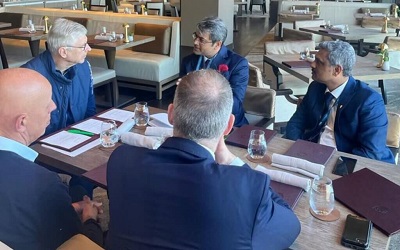New Delhi, (Asian independent) Legendary French coach Arsene Wenger has confirmed his visit to India in October to finalise the setting-up of a central academy in the country, which is the beginning of what is expected to be a significant association between FIFA, the sport’s world governing body, and the All-India Football Federation (AIFF).
Wenger’s visit to India was finalised when AIFF President Kalyan Chaubey and Secretary General Dr Shaji Prabhakaran met with Arsène Wenger, the FIFA Chief of Global Football Development, in Australia last month.
Wenger, who is expected to visit India in October, opened up on the inspiration for working with the AIFF on such a talent development project.
“I would say that football is the most popular sport in the world and it looks logical that one of the biggest countries in the world has access to football development. I’d say that India is a sporting country, and I’m hopeful that we can bring great joy to children in India and have fun by playing football.|
“I’m confident because I believe that success is linked to education. We want to allow educating young people to watch football in India,” he was quoted as saying in a report by aiff.com
According to Wenger, there’s a simple two-step process for developing academies in India. “Overall, it’s based on two things. First, it’s identifying talent. And then the quality of the educational programme and the coaching is vital. The AIFF has to take charge of the education with us and we need good cooperation.
“We will need to work together with the AIFF to identify the talent first. And after that, we have to group the best with the best. Under that, you have the grassroots game for the whole country. The starting point is to identify the talent and put the best with the best together,” he added.
For a country with 1.4 billion people, the vast talent pool is the biggest advantage in terms of identifying talent. But looking at the other side of the coin, it also presents an organisational challenge.
“The number is an advantage, but the organisation’s task gets tougher. 1.4 billion people, I’d say it’s a gold mine, but a gold mine, which, at the moment, we have not analysed or identified well.
“That’s why we need people inside the country who know where the talent is. This is why the cooperation between FIFA and the AIFF will be absolutely vital, with a strong desire. As per our conversation, the AIFF is highly focused and motivated to help us do that. I think we will do a great job together,” said Wenger.
“I met the President and the Secretary-General in Australia at the Women’s World Cup, and I must say I was impressed by their motivation and their capacity to organise what we want to do. I came out of the meeting very optimistic about our cooperation. We will start the work really soon,” added the Frenchman.
But how soon will that be? “I’m happy to go and see how the work is taking place, and I’ve planned to go to India at the end of October, or somewhere around that,” he shared.
Though cricket is the most popular sport in India, Wenger truly believes that for the country to become a sporting nation, there has to be room for other sports to grow as well.
“I don’t see why India would not be on the world map with the number of players. It’s a sporting country. At the moment, cricket is their number one sport. I have nothing against cricket. I was in England for a long time and I know how important cricket is to England. But there is room for other sports. Not all the kids can only play cricket. We want to give them that opportunity. Football is a fantastic sport where there is no discrimination based on weight or size. If you have good technique, you play,” said the man who coached Arsenal FC to their famous English Premier League title in 2003-04, a season when the Gunners did not lose a single match in the entire campaign.
Not many know that Wenger coached in Asia before his monumental stint at Arsenal, leading Japanese side Nagoya Grampus Eight between 1995 and 1996. The 73-year-old believes India should adopt Japan’s method of making grassroots and education a priority should they want to climb the rankings and become one of Asia’s leading footballing powers again.
While his decorated coaching career might be over, Wenger’s passion for the sport and decades of expertise fuels his dedication to keep developing the game in a different capacity, now in the shape of such talent development projects.








